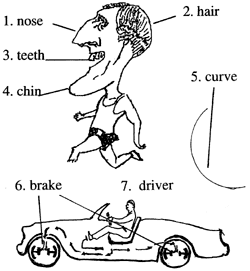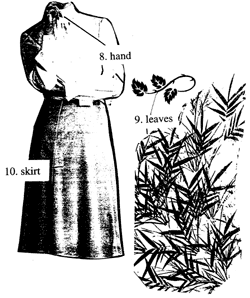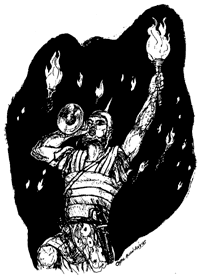Unit 28: Adjectives
Pictured Words
New Words

| 1. nose
|
| 2. hair
|
| 3. teeth
|
| 4. chin
|
| 5. curve
|
| 6. brake
|
| 7. driver
|

| 8. hand
|
| 9. leaves
|
| 10. skirt
|
Nouns
Sayings
Amusement is not good for all, some get credit from work.
Some say a garden gives a great degree of pleasure, others say only more work.
All errors can not be the result of alcohol.
All knives do not have the same curve to their blades.
No branch is so strong as to seem unmoved by the wind.
Everyone who spends his time gambling is asking for trouble.
Some curve to the skirt makes the opposite sex happy.
The use of the horn can give some protection to all.
All lines to the station may not be of steel, some will be of copper.
Adjectives
You have seen many adjectives in your lists of New Words.
They usually say something about the particular qualities of a noun.
They are put just before the noun.
There are some words which often do the work of adjectives but do not seem to have relation to any one noun.
The words "some" and "other" are like this.
Here are some examples of such words in relation to others in their group
Some
some Pharisees and teachers of the law were seated there.
some men had with them, on a bed.
some went on the rock.
Other
two doves or other young birds.
a great number of tax-farmers and others.
do to others as you would have.
In addition there are words which say something about the quantity we have in mind.
Such words are - "all", "every" and "no"
All
The eyes of all were fixed on him.
Did this most evil thing of all.
Master, we were working all night.
Every
Every good and true thing is given to us from heaven.
ready for every good work.
to everyone who has, more will be given.
No
no prophet is honoured.
do no violent acts to any man.
but they had no knowledge of it.

A Horn And A Flame
When Gideon came there, a man was giving his friend an account of his dream, saying, See, I had a dream about a cake of barley bread which, falling into the tents of Midian, came on to the tent, over-turning it.
And his friend in answer said, This is certainly the sword of Gideon, the son of Joash, the men of Israel: into their hands God has given up all the army of Midian.
Then Gideon, hearing the story of the dream and the sense in which they took it, gave worship;
then he went back to the tents of Israel, and said, Up!
for the Lord has given the army of Midian into your hands.
Then separating the three hundred men into three bands, he gave every man a horn, and a vessel in which was a flaming branch.
And he said to them, Keep your eyes on me, and do what I do;
when I come to the outer line of tents, whatever I do, you are to do the same.
At the sound of my horn, and the horns of those who are with me, let your horns be sounded all round the tents, and say, For the Lord and for Gideon.
So Gideon and the three hundred men who were with him came to the outer line of tents, at the start of the middle watch, when the watchmen had only then taken their stations;
And the horns were sounded and the vessels broken.
So the three bands all gave a loud note on their horns, and when the vessels had been broken, they took the flaming branches in their left hands, and the horns in their right hands ready for blowing, crying out,
For
Then they made a line round the tents, every man in his place;
and all the army, awaking from sleep, came running out, and with loud cries went in flight.
And the three hundred gave a loud note on their horns, and every man's sword was turned by the Lord against his brother all through the army;
and the army went in flight.
Additional Reading
The name of Gideon has the sense of "the cutter" or "the destroyer", and this story is all about the destruction of the opposing army of Midian.
Before this, however, it is said that two things took place.
First of all, Gideon had put an end to the altar which had been built in his town for a bad god.
Next, he called all the people to come together and become an army to go and fight the Midianites.
This nation had given trouble for a long while and were now about to make another attack.
The interesting thing is that when Gideon had been able to attract a large army to his cause, God said to him that he had too large a force.
He had to take his army down to running water and let them take a drink.
All the men who did this with care and so seemed to have experience in fighting were the best men.
Thus he made a selection from his forces of those who seemed likely to be good fighters.
The men who seemed to have any fear of the operation were let go back to their own houses.
By making these selections Gideon was able to get an army of responsible men.
But, it was small in number.
It was so small that even Gideon felt he would have to take a look at the tents of the Midianites.
So, Gideon went down to their tents, as our story says.
What came to his ears there was most pleasing and his small army got ready to make the attack .
The real reason for the way Gideon did things was that he took action as God said.
He did not do what seemed best to him.
The reward he got was an army of men who were conscious of the danger but well able to make adjustments in their ways of attack.
They seemed to be in a position that was quite impossible.
But their attempt was certain of success because God had given them both purpose and a good system.
Their three bands of men seemed like three separate armies as they were standing around the Midianites.
Their burning branches suddenly gave light when the vessels were broken, they were quickly seen and the sound of their horns made a fearful noise.
It was a bright idea for an effective military attack.
The great company of Midianites made every attempt to get away.
They did not see they were making a great error.
They put each other to death in their attempts to get away.
The story also says that Gideon's three bands of men made a quick adjustment of direction and put the opposing forces to flight with Gideon's army running fast behind them.
The Midianites were put into a position of great danger at a narrow point across the river.
There they were put to death in great numbers.
The two kings of the Midianites had their heads taken from their bodies and these were given to Gideon.
Helpful Notes
| Over-turning
| pushing down.
|
| stretched out flat
| being length ways on the ground.
|
| story of the dream
| dreams seemed to tell of the future
|
| taken their stations
| got into position.
|
| destroyed the altar
| broke down the place of religious respect.
|
| running water
| a small river.
|
| fear of the operation
| no desire for battle.
|
| did not
| did not this is a common way of shortening.
|
| made a fearful noise
| making a loud sound.
|
Interesting Facts And Records
War In Early Times
"The Lord put me down in the middle of the valley;
and it was full of bones.
I saw that there was a very great number of them on the face of the wide valley, and they were very dry".
So said the prophet, Ezekiel.
In this picture of death we get a view of the scale of destruction that came about when two armies exchanged at close range on the field of war.
The question put to Ezekiel was:"Can these bones come to life again?"
War between nations came about because of the desire for power and profit.
We do not expect the dead to come alive, of course.
War was no game of amusement.
Rulers took to the field, gambling on success.
Their fighting men were smashed by each other.
Frequently the men took large drinks of alcohol to make their senses dead.
It also made the violence of their acts greater.
The land of Egypt was a great power in very early times.
Its war apparatus was strong because of a store of copper and tin from its mines.
This was made into blades and knives for hand to hand fighting.
But, with the invention of iron making, and later of steel, other nations became stronger than Egypt.
The nations in Mesopotamia had iron.
Egypt did not.
In Isaiah we read of the error made by Israel whenever it put trust in Egypt.
Its power was coming to an end.
Horses were used a lot in war.
Great credit was given to the strength and size of the war horse.
All turned their attention to the number of horses they could bring together in their armies.
Men on foot took flight in fear before them, especially from swift carriages being pulled by horses.
A fighting man was clothed in a dress of leather with pieces of metal in curves over his chest.
The leather was a cushion for his skin.
From it there was hanging a hard leather skirt.
His hat was of iron tightened beneath his chin.
Only his nose and face were open.
His movements on the field were under the control of his chief using flags and sounding the horn.
A well organised army would put to flight a larger force that did not have that apparatus.
The troubles that came about because of war were very hard for the opposite sex.
The condition of women was sad when their army had the bitter experience of loss on the field.
The hopes they had pinned on their men were suddenly turned to pain.
Sometimes they were even taken away with hooks through their noses to a fearful existence.